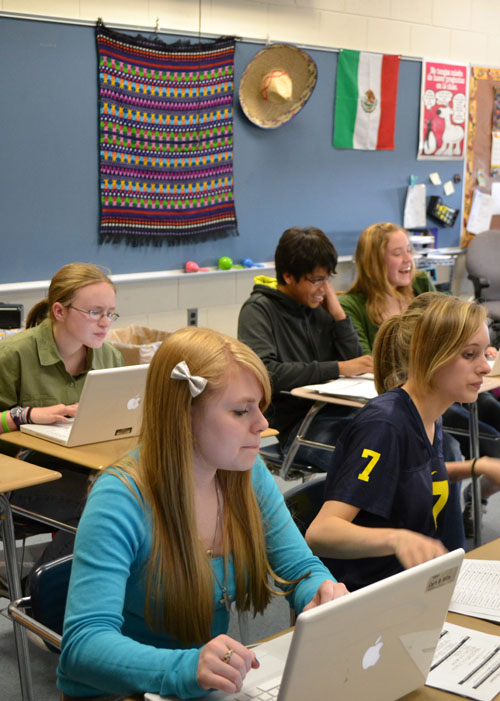By Tara Cavanaugh
In an eighth grade Spanish class at Tappan Middle School earlier this month, Jennifer Shaw’s students learned how to become weather forecasters.
Well, that’s what sounded like. Using the website ed.voicethread.com, Shaw’s students practiced their Spanish speaking skills while using a slew of technology resources.
For this particular assignment, each student picked a Spanish-speaking city, researched the weather forecast (written in Spanish), and put together an audio slideshow narrating the forecast. They also included a short video clip, recorded directly to the site.
The assignment did more than encourage students to work on their pronunciation and compare cultures. Students also needed to use the computers and website to make voice recordings, slides and graphics.
“It’s a pretty fun way to make a project,” said student Anuraag Bharadwha, adding that the site also helps him improve his Spanish pronunciation because he can practice before he records.
“This takes away a lot of the anxiety of speaking,” Shaw said. “A lot of kids are reluctant to do presentations in front of the class.”
Earlier in the school year, one student was even nervous about recording her voice while other students were in the room, but with enough practice she’s overcome her anxiety, Shaw said. Students can also record themselves at home if they choose.
Shaw also uses the site for testing. Instead of using class time to quiz students one by one and grade their speaking skills, students can submit oral responses through the site for assessment.
The Ann Arbor Public Schools Educational Foundation gave Shaw a foreign language grant to cover the students’ registration costs. Shaw said it costs about $1 per student.
This was the first year that Shaw used the website for class lessons and assignments. She’s found it so useful that she plans to use it for all three grades next year.
Her only complaint for now is a slow wireless connection. When all of Shaw’s students hop on the internet at the same time, the internet connection can get very slow. (Read about the district’s plans to expand wireless access)
View one student’s weather forecast below.
Related stories
- Local tech experts endorse the Technology Bond
- Why is Skyline included in the Tech Bond?
- INFOGRAPHIC: The Tech Bond by the numbers
- INFOGRAPHIC: AAPS Educators talk technology
- All district computers now out of warranty
- District hopes to expand wireless access
- Old computers lead to workarounds, wait time during reading intervention



Sounds like a great project, but why aren’t “language lab” type experiences like this available in all language classes in AAPS? Seems like a basic. This was available to me 5 days a week throughout the school year, albeit with older technology, when I was a French student at Pierce Middle School in the late 1960s. I learned to speak, read, write essays etc. in the Grosse Pointe Public School system in Middle School and high School. I understand and speak French very well some 40 years later with no additional French instruction since 1976. This is not rocket science and the methods for achieving fluency and competence in a non-native language have been understood for at least 50 years. Today’s technology should simply make it easier to implement, yet the instruction offered to my kids today in the AAPS is far inferior to what I experienced back when dinosaurs roamed the earth. So very sad. Does anyone else have similar observations?
I think it is the teacher and parents who should make education relevant to students. Technology should become an inclusive tool. Where all are able to have access to hardware and applicationsif needed.Notebooks, iPads, and netbook computers — paid for with the help of state dollars — are becoming an increasingly common sight in classrooms.